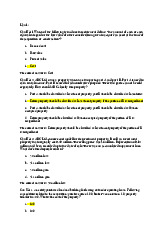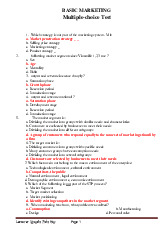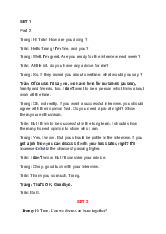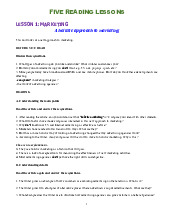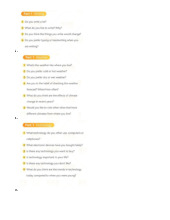


Preview text:
lOMoAR cPSD| 47304640 lOMoAR cPSD| 47304640 No. Vocabulary Meaning 1 Artificial Intelligence Trí tuệ nhân tạo 2 Revolution Cuộc cách mạng 3 Biotechnology Công nghệ sinh học 4 Accuracy độ chính xác 5 Authentication Xác thực 6 Leverage Đòn bẩy 7 Aspect Khía cạnh 8 Innovation Đổi mới sáng tạo 9 Verify Xác minh 10 Sensor Cảm biến 1. Gerund
- Gerund is a noun formed by using V-ing on a verb •
After prepositions and phrasal verbs
Ex: I’m good at solving problem • As the subject of a sentence
Ex: Coding is a creative process. •
After some verbs, e.g, hate, spend, don’t mind lOMoAR cPSD| 47304640
Ex: I enjoy working on challenging projects
- Common verbs that take the gerund include: admit, avoid, deny, dislike, enjoy, feel like,...
- The negative gerund = not + verb + -ing 2. Infinitives We use the infinitives - After adjectives
Ex: It's important to test your code before deploying.
- To express a reason or purpose
Ex: I want to become a software engineer.
- After some verbs, e.g., want, need, learn
Ex: She decided to quit her job and start her own business. •
Common verbs that take the infinitive include: (can’t) afford, agree, decide,
expect, forget, help, hope, learn, need, offer, plan, pretend, promise, refuse,
remember, seem, try, want, would like. •
The negative infinitive = not to + verb lOMoAR cPSD| 47304640 Feature Gerund (V-ing) Infinitives (to V) Function
Can function as a noun: subject, Can function as a noun, object, complement adjective, or adverb Formation Adding -ing to the verb Adding "to" before the verb Use as subject Reading books is very helpful
To learn a new language is hard Use as object She likes dancing He wants to travel the world. Use after
I'm interested in learning French. There's no point in waiting. prepositions
Use after certain Avoid making mistakes. She decided to quit her job. verbs Use after
It's exciting to meet new people. I'm happy to help you. adjectives Use after nouns The idea of moving is scary. She has a plan to start a business
